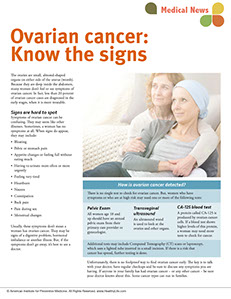MEDICAL NEWS
Ovarian cancer: Know the signs

The ovaries are small, almond-shaped organs on either side of the uterus (womb). Because they are deep inside the abdomen, many women don’t feel or see symptoms of ovarian cancer. In fact, less than 20 percent of ovarian cancer cases are diagnosed in the early stages, when it is more treatable.
Signs are hard to spot
Symptoms of ovarian cancer can be confusing. They may seem like other illnesses. Sometimes, a woman has no symptoms at all. When signs do appear, they may include:
• Bloating
• Pelvic or stomach pain
• Appetite changes or feeling full without eating much
• Having to urinate more often or more urgently
• Feeling very tired
• Heartburn
• Nausea
• Constipation
• Back pain
• Pain during sex
• Menstrual changes
Usually, these symptoms don’t mean a woman has ovarian cancer. They may be signs of a digestive problem, hormonal imbalance or another illness. But, if the symptoms don’t go away, it’s best to see a doctor.
How is ovarian cancer detected?
There is no single test to check for ovarian cancer. But, women who have symptoms or who are at high risk may need one or more of the following tests:
• Pelvic Exam: All women age 18 and up should have an annual pelvic exam from their primary care provider or gynecologist.
• Transvaginal ultrasound: An ultrasound wand is used to look at the ovaries and other organs.
• CA-125 blood test: A protein called CA-125 is produced by ovarian cancer cells. If a blood test shows higher levels of this protein, a woman may need more tests to check for cancer.
Additional tests may include Computed Tomography (CT) scans or laproscopy, which uses a lighted tube inserted in a small incision. If there is a risk that cancer has spread, further testing is done.
Unfortunately, there is no foolproof way to find ovarian cancer early. The key is to talk with your doctor, have regular checkups and be sure to discuss any symptoms you are having. If anyone in your family has had ovarian cancer – or any other cancer – be sure your doctor knows about this. Some cancer types can run in families.

Download an offline pdf file.
MEDICAL NEWS ARTICLES
<
>
2021 © American Institute for Preventive Medicine - All Rights Reserved. Disclaimer | www.HealthyLife.com








